| |||||||||||||||||||||||||||||||||
| Facts > Pagan Christs > Heroes | |||||
| Glycon | Simon | Apollonius of Tyana | Pythagoras | Orpheus | |
| Isis / Osiris | Dionysus | Zalmoxis | Kore | Samothrace | |
| Heroes | Attis | Adonis | Mithras | Other godmen |
| Men who became divine |
|
Was Christianity new? Was Christianity unique? Lets talk about Pagan Heroes regular men and women who became divine—who became gods.
|
|
description = hero = divine
|
Now it is an
excellent thing, methinks, as all men of understanding must agree,
to receive in exchange for mortal
labours an immortal fame. In the case of Heracles,
for instance, it is generally agreed that during the whole time which
he spent among men he submitted to great and continuous labours and
perils willingly, in order that he might confer benefits upon
the race of men and thereby gain immortality; and likewise
in the case of other great and good
men, some have attained to heroic honours and others to honours
equal to the divine, and all
have been thought to be worthy of great praise, since history immortalizes
their achievements. |
|
dr beard confirms greg's opinion
|
The emperors
were not the only 'divine humans' in the Roman empire. Perhaps
the deification of emperors was itself an impetus to the wider spread
of divine status in other areas of Roman society. Or perhaps all these
developments are symptomatic of an increasingly flexible
perception of the boundary between humans and the gods in the
Roman empire (see 2.8). That humans
should turn out to be gods on earth was clearly a possibility;
and the performance of miracles was prima-facie evidence of divinity.
Christians, however, were committed to the view that the miracles proved
divinity only in the case of Jesus; pagans were not so limited. |
| Historical political men who became divine |
|
|
On the 5th day before the Kalends of February,
for… the deified Severus
… a cow…. |
|
diefied emperor named by christian Pronsenes was received by God (receptus ad deum [Christian code]) |
[on the front of the sarcophagus] |
 Historical
men who became divine Historical
men who became divine |
|
spartan hero lycurgus temple worshiped
|
On the death of Lycurgus
they [Lacedaemonians = Spartans]
built him a temple, and ever since they have worshipped
him with the utmost reverence. |
|
|
1.60 .. There was in the Paeanian district
a woman named Phya, whose height was almost six feet, and who
was altogether comely to look upon. This woman they clothed in complete
armour, and, instructing her as to the carriage which she was to maintain
in order to beseem her part, they placed her in a chariot and drove
to the city. Heralds had been sent forward to precede her, and to make
proclamation to this effect, "Citizens of Athens, receive again
Pisistratus with friendly minds. Athena, who of all men honours him
the most, herself conducts him back to her own citadel." This they
proclaimed in all directions, and immediately the rumour spread throughout
the country districts that Athena was bringing back her favourite. They
of the city also, fully persuaded
that the woman was the veritable goddess, worshipped her, and
received Pisistratus back. |
| Athenian heroes Adrastus & Melanippus
|
The Thebans consenting, Cleisthenes carried
Melanippus back with him, assigned him a precinct within the
town-hall, and built him a shrine
there in the safest and strongest part. The reason for his so doing
(which I must not forbear to mention) was, because Melanippus was Adrastus'
great enemy, having slain both his brother Mecistes and his son-in-law
Tydeus. Cleisthenes, after assigning the precinct to Melanippus, took
away from Adrastus the sacrifices and festivals wherewith he had till
then been honoured, and transferred them to his adversary. Hitherto
the Sicyonians had paid extraordinary honours to Adrastus, because the
country had belonged to Polybus, and Adrastus was Polybus' daughter's
son, whence it came to pass that Polybus, dying childless, left Adrastus
his kingdom. Besides other ceremonies, it had been their custom
to honour Adrastus with tragic choruses, which they assigned to him
rather than Dionysus, on account of his calamities. Cleisthenes
now gave the choruses to Dionysus, transferring to Melanippus the rest
of the sacred rites. |
| Delphian heroes Phylacus & Autonous - sacred precints
|
39. These men,
the Delphians maintain, were two
Heroes belonging to the place-by name Phylacus
and Autonous-each
of whom has a sacred precinct near the temple; one, that of
Phylacus, hard by the road which runs above the temple of Pronaia; the
other, that of Autonous, near the Castalian spring, at the foot of the
peak called Hyampeia. |
| Gargaphian hero Androcrates sacred priecinct |
So they took their arms, and proceeded along the
slopes of Cithaeron, past Hysiae, to the territory of the Plataeans;
and here they drew themselves up, nation by nation, close by the fountain
Gargaphia, and the sacred precinct
of the Hero Androcrates, partly along some hillocks of no great
height, and partly upon the level of the plain. |
| Acanthian hero Artachaees sacrifice, pray to
|
117. It was while he remained here that Artachaees,
who presided over the canal, a man
in high repute with Xerxes, and by birth an Achaemenid, who was
moreover the tallest of all the Persians, being eight feet high, and
who had a stronger voice than any other man in the world, fell sick
and died. Xerxes therefore, who was greatly afflicted at the mischance.
carried him to the tomb and buried him with all magnificence; while
the whole army helped to raise a mound over his grave. The Acanthians,
in obedience to an oracle, offer
sacrifice to this Artachaees as a hero, invoking him in their prayers
by name. But King Xerxes sorrowed greatly over his death. |
| Amathusian hero Onesilus sacrifice to |
114. The Amathusians, because Onesilus had laid
siege to their town, cut the head off his corpse, and took it with them
to Amathus, where it was set up over the gates. Here it hung till it
became hollow; whereupon a swarm of bees took possession of it, and
filled it with a honeycomb. On seeing this the Amathusians consulted
the oracle, and were commanded to take down the head and-bury it, and
thenceforth to regard Onesilus as
a hero, and offer sacrifice to him year by year; so it would
go the better with them. And to this day the Amathusians do as they
were then bidden. |
| Teian hero Timesius of Clazomenae worshiped
|
168. Thus fared it with the men of the city of
Phocaea in Ionia. They of Teos did and suffered almost the same; for
they too, when Harpagus had raised his mound to the height of their
defences, took ship, one and all, and sailing across the sea to Thrace,
founded there the city of Abdera. The site was one which Timesius
of Clazomenae had previously tried to colonise, but without any
lasting success, for he was expelled by the Thracians. Still the
Teians of Abdera worship him to this day as a hero. |
| Sicyonian hero Adrastus |
67.... This king [Cleisthenes, king of Sicyon],
when he was at war with Argos, put an end to the contests of the rhapsodists
at Sicyon, because in the Homeric poems Argos and the Argives were so
constantly the theme of song. He likewise conceived the wish to drive
Adrastus, the son of Talaus, out of his country, seeing that he was
an Argive hero. For Adrastus had
a shrine at Sicyon, which yet stands in the marketplace of the town.
|
| Delphian hero Cyrnus worshiped
|
167.... On this the people of Agylla sent to Delphi
to ask the oracle how they might
expiate their sin. The answer of the priestess required them
to institute the custom, which they still observe, of honouring the
dead Phocaeans with magnificent funeral rites, and solemn games, both
gymnic and equestrian. Such, then, was the fate that befell the Phocaean
prisoners. The other Phocaeans, who had fled to Rhegium, became after
a while the founders of the city called Vela, in the district of Oenotria.
This city they colonised, upon the showing of a man of Posidonia, who
suggested that the oracle had not meant to bid them set up a town in
Cyrnus the island, but set up the worship
of Cyrnus the hero. |
| Egestaean hero Philip temple and worshiped with sacrifices
|
47. Another man who accompanied Dorieus and died
with him, was Philip the son of Butacidas....
This Philip was an Olympian victor, and the handsomest Greek of his
day. His beauty gained him honours at the hands of the Egestaeans which
they never accorded to any one else; for
they raised a hero-temple over his grave, and they still worship him
with sacrifices. |
| Amphipolitan hero Bradisas sacrificed to, games
|
5.11. Brasidas
was buried in the city with public honours in front of what is now the
market-place. The whole body of the allies in military array followed
him to the grave. The Amphipolitans enclosed his sepulchre,
and to this day they sacrifice to
him as to a hero, and also celebrate games and yearly offerings in his
honour. . ... For they considered Brasidas to have been their
deliverer... |
|
|
I, the torchbearer of the most sacred mysteries
at Eleusis, <Nicagoras>, son af Minucianus, an Athenian, investigated
the tombs [in the Valley of the Kings near Egyptian Thebes] many lifetimes
after the divine Plato. |
| Like divine Gods, divine Heroes had temples, were worshiped, and sacrificed and prayed to. |
|
athenians answer to request to submit to xerxis with general statement of their reliance on gods and heroes
|
143. ... Return rather at once, and tell Mardonius
that our answer to him is this, 'So long as the sun keeps his present
course, we will never join alliance with Xerxes. Nay, we shall oppose
him unceasingly, trusting in the
aid of those gods and heroes whom he has lightly esteemed, whose
houses and whose images he has burnt with fire.' And come not again
to us with words like these; nor, thinking to do us a service, persuade
us to unholy actions. You are the guest and friend of our nation-we
would not that you should receive hurt at our hands." |
|
and after they won, the general themistoclese attributed win to gods AND HEROES
|
We have now had the great good luck to
save both ourselves and all Greece by the repulse of this vast cloud
of men; let us then be content and not press them too hard,
now that they have begun to fly. Be sure we have not done this by our
own might. It is the work of gods
and heroes, who were jealous that one man should be king at once
of Europe and of Asia—more especially a man like this, unholy
and presumptuous—a man who esteems alike things sacred and things
profane; who has cast down and burnt the very images of the gods themselves;
who even caused the sea to be scourged with rods and commanded fetters
to be thrown into it. |
|
Xerxes libates heroes of troy
|
7.43. On reaching the Scamander, which was the
first stream, of all that they had crossed since they left Sardis, whose
water failed them and did not suffice to satisfy the thirst of men and
cattle, Xerxes ascended into the Citadel of Priam, since he had a longing
to behold the place. When he had seen everything, and inquired into
all particulars, he made an offering of 1,000 oxen to the Trojan Athena,
while the Magians poured libations
to the heroes who were slain at Troy. |
|
The Spartan Brasidas calls upon gods and heroes |
[page 766] 4.84. . ..Brasidas....addressed them as follows:.... [page 777] 4.87. . .. "But if you plead that you cannot accept the proposals which I offer, and insist that you ought not to suffer for the rejection of them because you are our friends; if you are of opinion that liberty is perilous and [page 778] should not in justice be forced upon any one, but gently brought to those who are able to receive it, I shall first call the gods and heroes of the country to witness that I have come hither for your good, and that you would not be persuaded by me: I shall then use force and ravage your country without any more scruple. |
| Mythical men who became divine |
| Herculese is the standard example divine
|
Indeed it is reasonable to suppose that the first
concern of Heracles was for
this country as his birthplace, and that, after he had cleared the land
of wild beasts, he presented it to the peasants, and
for this benefaction was accorded divine honours. |
|
|
13. And besides these there are other gods,
they say, who were terrestrial, having
once been mortals, but who, by reason of their sagacity and the good
services which they rendered to all men, attained immortality,
some of them having even been kings in Egypt. Their
names, when translated, are in some cases the same as those of the celestial
gods, while others have a distinct appellation, such as Helius,
Cronus, and Rhea,
and also the Zeus who is called
Ammon by some, and besides
these Hera and Hephaestus,
also Hestia, and, finally,
Hermes. Helius
was the first king of the Egyptians....From these last were sprung five
gods, one born on each of the five days which the Egyptians intercalate
; the names of these children were Osiris
and Isis, and also Typhon,
Apollo, and Aphrodite
; and Osiris when translated is Dionysus,
and Isis is more similar to Demeter
than to any other goddess; and after Osiris married Isis and succeeded
to the kingship he did many things of service to the social life of
man. |
| Daedalus temple, divine honors temple
|
Daedalus,
they relate, copied the maze of the Labyrinth which
stands to our day and was built, according to some, by Mendes,' but
according to others, by king Marrus, many years before the reign of
Minos. And the proportions of the ancient statues of Egypt are the same
as in those made by Daedalus among the Greeks. The very beautiful propylon
of the temple of Hephaestus in Memphis was also built by Daedalus,
who became an object of admiration and was
granted a statue of himself in wood, which was made by his own
hands and set up in this temple;
furthermore, he was accorded great fame because of his genius and, after
making many discoveries, was granted
divine honours ; for on one of the islands off Memphis there
stands even to this day a temple
of Daedalus, which is honoured by the people of that region. |
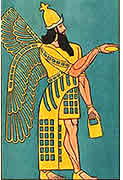

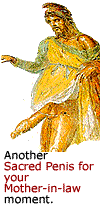
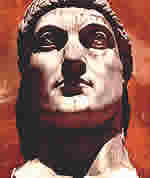 diefied
emperors worshiped
diefied
emperors worshiped
 athenian
heroine Paeania worshiped
athenian
heroine Paeania worshiped

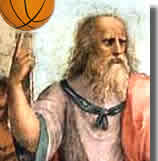 divine
plato
divine
plato

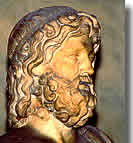 euhermerishm—gods also viewed as heroes
euhermerishm—gods also viewed as heroes